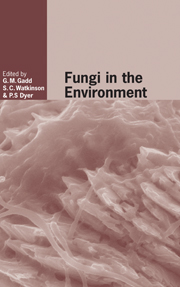Book contents
- Frontmatter
- Contents
- List of contributors
- Preface
- I Imaging and modelling of fungi in the environment
- II Functional ecology of saprotrophic fungi
- III Mutualistic interactions in the environment
- IV Pathogenic interactions in the environment
- V Environmental population genetics of fungi
- VI Molecular ecology of fungi in the environment
- Index
Preface
Published online by Cambridge University Press: 03 November 2009
- Frontmatter
- Contents
- List of contributors
- Preface
- I Imaging and modelling of fungi in the environment
- II Functional ecology of saprotrophic fungi
- III Mutualistic interactions in the environment
- IV Pathogenic interactions in the environment
- V Environmental population genetics of fungi
- VI Molecular ecology of fungi in the environment
- Index
Summary
Fungi are ubiquitous in the aquatic and terrestrial environments, occurring as unicellular yeasts, polymorphic and filamentous fungi, and as both free-living and symbiotic forms. In the terrestrial environment, that part of the biosphere most closely associated with fungal activities, fungi are of fundamental importance as decomposer organisms, plant pathogens and mutualistic symbionts (mycorrhizas and lichens), playing important roles in carbon, nitrogen and other biogeochemical cycles. In soil they can comprise the largest pool of biomass (even exceeding that of other microorganisms and invertebrates) and also play a role in maintenance of soil structure owing to their filamentous branching growth habit and exopolymer production. Despite their important roles in the biosphere, fungi are frequently neglected within broader environmental and microbiological spheres, in contrast to bacteria. For example, symbiotic mycorrhizal fungi can be associated with the majority of plant species and are responsible for major transformations and re-distribution of inorganic nutrients as well as carbon flow, while free-living fungi have major roles in decomposition and solubilization of plant and other organic materials, including xenobiotics, and low-solubility phosphate compounds. As well as this general neglect, mycological interests can be somewhat fragmented between traditional microbiological and botanical activities and the fields of cell biology, plant symbiosis, and pathogenesis and genetics. This symposium volume provides a unique account of modern environmental mycology and includes accounts of major recent advances in molecular, imaging and modelling methodologies, which have the potential to draw together these disparate areas of mycology.
- Type
- Chapter
- Information
- Fungi in the Environment , pp. xvii - xxPublisher: Cambridge University PressPrint publication year: 2007
- 1
- Cited by



